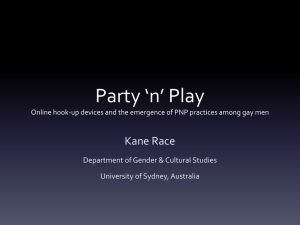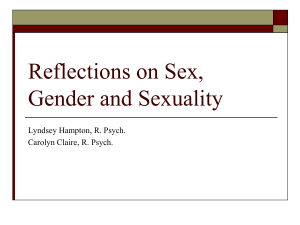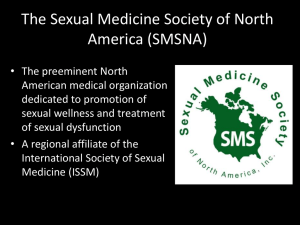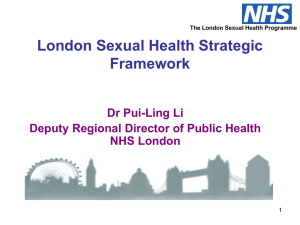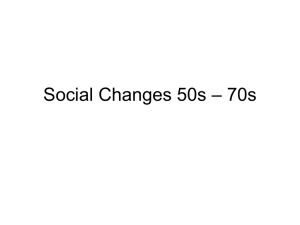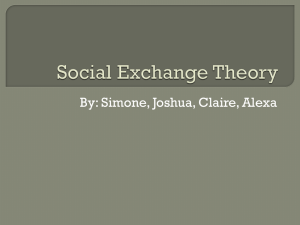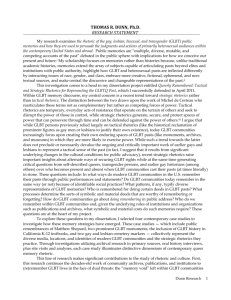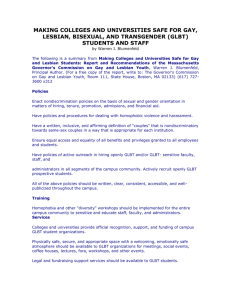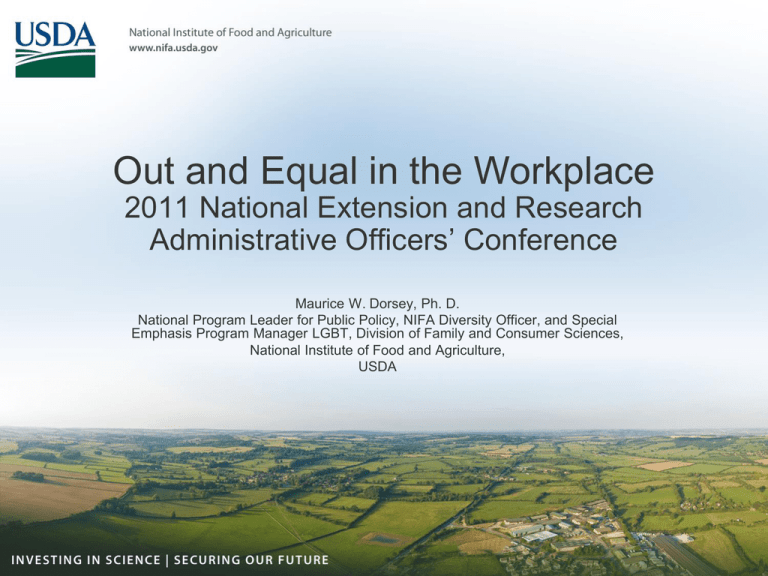
Out and Equal in the Workplace
2011 National Extension and Research
Administrative Officers’ Conference
Maurice W. Dorsey, Ph. D.
National Program Leader for Public Policy, NIFA Diversity Officer, and Special
Emphasis Program Manager LGBT, Division of Family and Consumer Sciences,
National Institute of Food and Agriculture,
USDA
VIDEO MONTAGE
What We Will Discuss Today
•
•
•
•
•
•
•
Diversity
Critical Conversations
Terminology
Definition
Demographics
Sexual Orientation At USDA
Sexual Orientation in the Federal
Government
• Current GLBT Issues in the United States
• Workplace Issues
• Promoting Diversity
Diversity Factors
• Age, Gender, Race/Color, Ability
(visible)
• Heritage, Religion, Accent, National
Origin, Physical Characteristics,
Tenure, Family Status, Education,
Sexual Orientation, Geography,
Native Language, Beliefs,
Classification, Hourly/Salaried, Life
Experiences, others…..(invisible)
Critical Conversations
• Are conversations that usually you
usually don’t want to have... Because it
can make people uncomfortable, can
show us where our barriers/biases are,
and challenge our belief system.
• Are conversations that people need to
gain knowledge, wisdom, understanding;
and can prevent and resolve conflicts.
• The intent of our conversation today is to
educate.
Terminology
• GLBT is the abbreviation for gay,
lesbian, bisexual, and transgender.
Also seen as LGBT.
– Gay is a term given to people of the
same gender who are attracted sexually
and emotionally to each other.
– Lesbian is a term given to females who
are attracted sexually and emotionally to
females.
– Bisexual is a term given to people who
are attracted to some males and females.
Terminology Continued
– Transgender is a term given to people
whose gender expression (how an
individual externally communicate their
gender identity to others) at least
sometimes runs contrary to what others
in the same culture would normally
expect. Includes transsexuals, crossdressers, drag queens/kings.
Terminology Continued
– Gender identity is our innermost concept
of self as “male” or “female”---what we
perceive and call ourselves. Individuals
are conscious of this between the ages of
18 months and 3 years. Most people
develop a gender identity that matches
their biological sex. For some, gender
identity is different from biological sex
(transsexuals)
Terminology Continued
– Transsexual is a term given to those who do
not identify with their birth-assigned genders.
Transsexuals sometimes alter their bodies
surgically and/or hormonally. The transition
(formally called “sex change”) is a multi-step
process that may take years and may include
sex reassignment surgery. Approximately
2,000 Americans undergo sex change
surgery every year. The number of gender
reassignment procedures conducted
worldwide is estimated to be five time larger*
– *Source: Surgeryencylopedia.com and the Gay and Lesbian
Medical Association
Terminology Continued
– The U.S. Tax Court ruled in February
2010 that hormone therapy and gender
reassignment surgery are tax deductable
because the procedures are medically
necessary.
Source: O’Donnabhain versus IRS reported via AOL
News 2/3/10
Terminology Continued
– “Coming Out” of the closet is to publicly
declare one’s identity. To be in the closet
is to hide one’s identity. Coming out is a
life long process in each new situation a
person must decide whether to come out
or stay in to parents, friends, and coworkers.
Terminology Continued
– Conversion Therapy is an attempt to
change a person’s sexual orientation.
Also known as a cure for homosexuality.
It usually does not work. It can produce
feelings of depression, hopelessness,
shame, and anxiety. Some people
become suicidal.
Terminology Continued
• Down Low are men who discreetly have
sex with other men while in sexual
relationships with women are said to be
on the “down low” or DL. Often these
men do not consider themselves gay or
bisexual and their female partners are
not aware that they have sex with other
men, thus the term means “in-hiding”
The practice of “straight men” secretly
having sex with men is seen across all
ethnic groups.
Terminology Continued
– Homophobia is the dread of being in
close quarter with homosexuals as well
as homosexuals’ self loathing. (Society and
the Healthy Homosexual,1972) An aversion to
gay or homosexual people, their lifestyle,
culture, or behavior. An irrational fear of
homosexuality. (American Heritage Dictionary)
Terminology Continued
– Heterosexism is a value system that
denies, denigrates, and stigmatizes any
non-heterosexual form of behavior,
identity, relationship or community. An
“ism” like sexism or racism where one is
considered better that others. Creates
misinformation and misconceptions.
Operates through a dual process of
invisibility and attack.
Terminology Continued
– Lavender Ceiling is when GLBT issues
are avoided organizationally and
individually. When homophobia and
heterosexism are an established part of
the workplace culture and the open
service, career, development and
promotional advancement of GLBT
employees is impeded or prevented.
Terminology Continued
– Queer is a negative term used against
people perceived to be GLBT. Fag and
faggot are also negative terms. Dyke is a
negative term used to describe lesbians.
These terms should not be used.
What is Sexual Orientation?
• Sexual Orientation is an enduring,
emotional, romantic, sexual, or
affectionate attraction to another person.
• Everyone has a sexual orientation and
falls on a scale of somewhere between
purely heterosexual and purely
homosexual.
• Sexual Orientation is different from
sexual behavior because it refers to
feelings and self-concept. Individuals
may or may not express their sexual
orientation in their behaviors.
What Is Sexual Orientation?
– Sexual Orientation is not a conscious choice
that can be voluntarily changed.
– Human beings cannot choose to be gay or
straight.
– Sexual Orientation emerges for most people
in early adolescence (before the age of 5
without any prior sexual experience.
– Homosexuality is not a mental illness and
implies no impairment in judgment, stability,
reliability or general social or vocational
capabilities.
Demographics
• It is estimated that gays and lesbians
make up 5% of the United States
population.
• The U.S. Census Bureau estimates
the current U.S. population to be
300,000,000.
• The estimated number of gays and
lesbians in the U.S. is 15,000,000.
• There are 3.3 million gay & lesbian
Demographics
• Estimated $712 billion consumer
market in 2008.
• Projected to exceed $835 billion by
2011.
• States with the largest total number of
GLBT adults: CA, DC, FL, IL, NY, and
TX.
• States with the largest percentages of
gay, lesbian, and bisexual adults: DC,
Demographics
• 99.3 percent of U.S. counties reported
same-sex cohabitating unmarried
partners.
• The largest increases since the 1990
census were reported in rural,
sparsely populated areas.
Sexual Orientation at USDA
• Secretary Espy issued the
Department’s EEO and Civil Rights
Policy Statement which specifically
prohibited discrimination and
harassment based on sexual
orientation, 1993.
• A Departmental Task Force was
formed to develop recommendations
designed to implement the
Secretary’s policy, June 1993.
Sexual Orientation at USDA
• USDA announced the formation of the
second USDA Task Force on Sexual
Orientation, July 1999.
• “If the Department fully implemented
its sexual orientation …..and the
prevention of costly complaints. We
have estimated the potential
savings….approximately $23 million
annually.”
Sexual Orientation
• Secretary’s Gay & Lesbian Employee
Advisory Council (GLEAC), 2000.
• Secretary Vilsack signed
Departmental Regulation 4230-002
creating a Special Emphasis Program
for GLBT employees, June 4, 2009.
Sexual Orientation in Federal
Government
• The Lavender Scare---the cold war
persecution of GLBT in federal
government.
• Civil Service Reform Act of 1978--protection from non-merit based
personnel actions.
• 1995 Executive Order 12968---security
clearances for GLBT.
• 1998 Executive Order 13087---prohibits
employment discrimination based on
sexual orientation in federal government.
Sexual Orientation in Federal
Government
• OPM publishes “Addressing Sexual
Orientation Discrimination in Federal
Civilian Employment: A Guide to
Employee’s Rights, June 1999.
• Oncale vs. Sundowner---Same-sex
sexual harassment violates 1964 Civil
Rights Act.
GLBT Current Issues
• Employment Protections---still no federal law, 28
states can fire GLBT; 38 states can fire because
of gender identification; Employment NonDiscrimination Act (ENDA).
• Same-sex partnerships---Defense of Marriage
Act (DOMA), 1996; federal denial 1,138 benefits
• Domestic partner benefits
• Don’t Ask, Don’t Tell (DADT)
• Hate Crime Violence Legislation---Matthew
Sheppard and James Byrd, Jr.
• Heterosexism, Fear, Lavender Ceiling, others
What You Can Do to Promote
GLBT in the Workplace
•
•
•
•
•
•
•
Be honest
Be a partner
Be a role model
Be an ally
Be an activist
Be a teacher
Be a student



